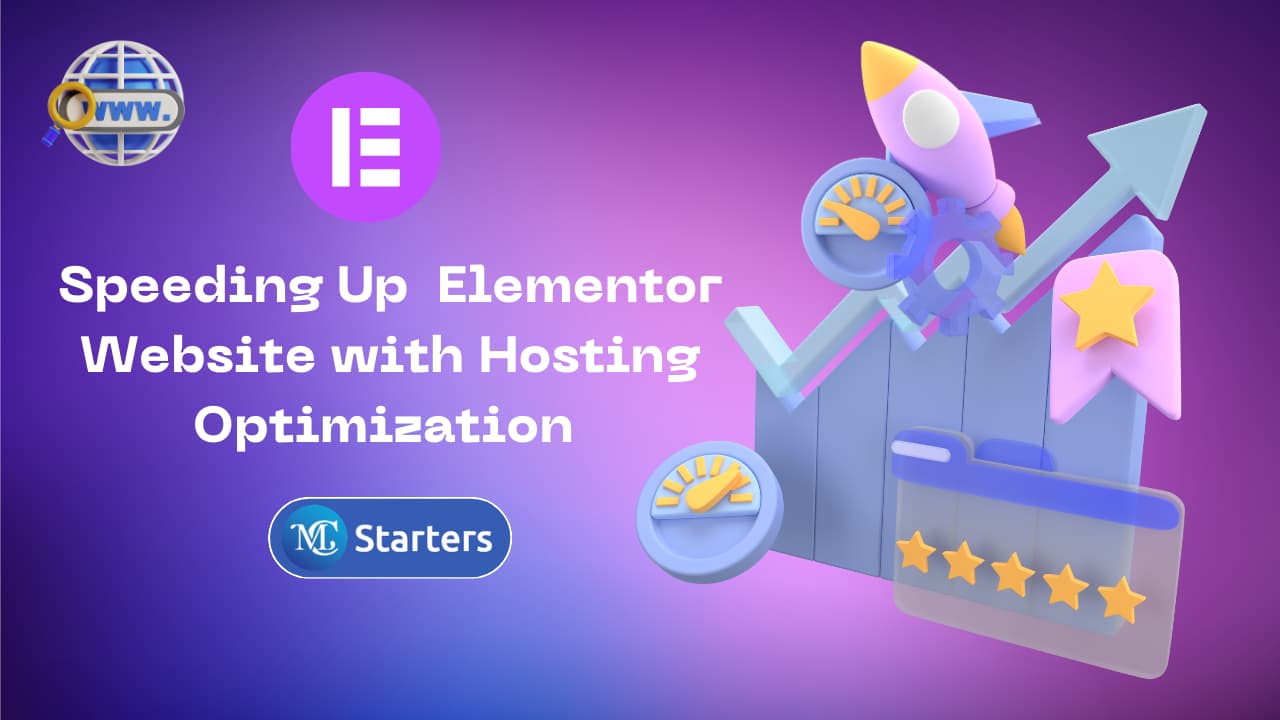Speeding Up Your Elementor Website with Hosting Optimization

Speeding up your Elementor Website is a crucial factor in today’s digital landscape. Visitors expect fast-loading pages, and search engines reward speed with better rankings. If you’re using Elementor, a powerful WordPress page builder, optimizing your hosting environment is essential to ensure your website loads quickly and provides an excellent user experience. In this blog post, we’ll explore hosting optimization techniques that can supercharge your Elementor website’s performance.
1. Choosing the Right Hosting Provider
The foundation of hosting optimization starts with selecting the right hosting provider. Look for a provider that specializes in WordPress hosting and offers reliable, high-performance solutions.
Here’s a closer look at what to consider when choosing your hosting provider:
1. Specialization in WordPress Hosting:
- Look for a hosting provider that specializes in WordPress hosting. WordPress-specific hosting providers are well-versed in the intricacies of the platform and can tailor their services to maximize WordPress performance.
2. Performance-Oriented Solutions:
- Opt for a provider that offers high-performance hosting solutions. Elements such as faster server hardware, optimized server configurations, and enhanced resource allocation can significantly impact your website’s speed.
3. Scalability:
- Consider your website’s growth potential. Choose a hosting provider that allows for easy scalability, ensuring that your website can handle increased traffic and resource demands without sacrificing performance.
4. Server Location:
- Server location matters. Select a hosting provider with data centers in regions close to your target audience. This reduces latency and accelerates content delivery to visitors in those areas.
5. Server Uptime and Reliability:
- Check the hosting provider’s uptime record. A reliable hosting provider should offer high uptime percentages, ensuring your website is accessible to visitors at all times.
6. Customer Support:
- Evaluate the quality of customer support. Responsive and knowledgeable support teams can assist you in resolving any hosting-related issues quickly.
7. Reviews and Recommendations:
- Research customer reviews and recommendations. Real-world experiences from other website owners can provide valuable insights into a hosting provider’s performance and reliability.
8. Managed WordPress Hosting:
- Managed WordPress hosting services can be an excellent choice. They often include automated updates, server-level caching, and security features that are optimized for WordPress, making it easier to maintain a high-performing website.
9. Price vs. Performance:
- While cost is a consideration, prioritize performance and reliability over price alone. A slightly higher investment in hosting can yield significant benefits in terms of website speed and user satisfaction.
10. Hosting Migration Support:
- If you’re migrating an existing website, check if the hosting provider offers migration support. A seamless migration process ensures minimal downtime during the transition.
2. The Significance of Server Location
The physical location of your hosting server matters. Choose a server location that’s geographically close to your target audience to reduce latency and speed up content delivery.
3. Optimizing Server Resources for Elementor
Ensure your hosting plan provides sufficient server resources, including CPU, RAM, and bandwidth, to handle Elementor’s resource-intensive tasks.
4. Leveraging SSD Storage for Faster Data Retrieval
Hosting providers using Solid State Drives (SSD) can significantly improve data access speed, leading to faster website performance.
Solid State Drives (SSDs) have revolutionized data storage by offering incredible speed and reliability compared to traditional Hard Disk Drives (HDDs). Leveraging SSD storage can have a profound impact on your Elementor website’s performance. Here’s why it matters and how to make the most of SSDs:
Why SSDs Matter:
- Speed: SSDs are significantly faster than HDDs in data retrieval and write operations. This means your website’s files, databases, and assets load more quickly.
- Reliability: SSDs have no moving parts, making them more durable and less prone to mechanical failure. This reliability ensures consistent website performance.
- Improved Page Load Times: Faster data access means web pages load faster, improving the user experience and potentially boosting search engine rankings.
How to Leverage SSD Storage:
- Choose an SSD Hosting Provider: When selecting a hosting provider, opt for one that offers SSD storage as part of its hosting packages. Many reputable hosting companies now exclusively use SSDs for their servers.
- Opt for Managed WordPress Hosting with SSDs: If you’re running a WordPress website with Elementor, consider managed WordPress hosting services that utilize SSDs. Managed hosting often includes additional performance optimizations and SSD benefits.
- Website Migration: If your current hosting environment uses HDDs, consider migrating your website to an SSD-based hosting plan. Most hosting providers offer migration services to ensure a seamless transition.
- Regular Backups: While SSDs are reliable, it’s essential to maintain regular backups of your website. This precaution ensures that your data is safe, even in the unlikely event of an SSD failure.
- Monitor Website Performance: Regularly monitor your website’s performance to gauge the impact of SSD storage. Tools like Google PageSpeed Insights and GTmetrix can help assess loading times and identify areas for improvement.
- Content Delivery: Implement a Content Delivery Network (CDN) in conjunction with SSD hosting. CDNs further enhance website speed by distributing content across multiple servers globally, reducing latency.
5. Utilizing Content Delivery Networks (CDNs)
Implementing a Content Delivery Network (CDN) distributes your website’s content across multiple servers worldwide, reducing loading times for visitors from different regions.
6. Minimizing Server Response Time
Fine-tune your server’s configurations, optimize code, and streamline your database to minimize server response time and handle requests efficiently.
7. Keeping Your WordPress and Plugins Updated
Regularly update your WordPress core, Elementor, and plugins to take advantage of performance enhancements, bug fixes, and security updates.
Maintaining your WordPress core, Elementor, and plugins up-to-date is crucial for a high-performing and secure Elementor website. Here’s why it matters and how to do it effectively:
- Performance Enhancements: Updates often include performance improvements, optimizing code, and enhancing resource utilization, leading to faster loading times and better website performance.
- Bug Fixes: Developers release updates to fix bugs and issues discovered in previous versions. Updating ensures a smoother and error-free user experience.
- Security Updates: Security vulnerabilities can be exploited by malicious actors. Regular updates patch known vulnerabilities, reducing the risk of security breaches.
- Compatibility: As WordPress, Elementor, and plugins evolve, compatibility with newer versions becomes essential. Keeping everything updated ensures that your website functions correctly.
How to Keep Everything Updated:
- WordPress Core: Enable automatic updates for WordPress core. To do this, go to your WordPress dashboard, navigate to “Dashboard” > “Updates,” and enable automatic updates. Additionally, always back up your site before major updates.
- Elementor: Elementor updates can be managed through the WordPress plugin dashboard. Visit “Plugins” and click on “Update” next to Elementor when updates are available.
- Plugins: Keep all installed plugins updated. Regularly check for updates in the WordPress plugin dashboard and apply them.
- Themes: Ensure your WordPress theme is also up-to-date. Themes can affect website performance, so keep them current.
- Testing: After updates, thoroughly test your website to ensure everything works as expected. Look for any issues with design, functionality, or performance.
- Backup: Always back up your website before making major updates. This ensures you can restore your site to a working state if any issues arise.
- Staging Environment: Consider setting up a staging environment to test updates before applying them to your live site. Staging allows you to identify and resolve issues without affecting your site’s visitors.
By keeping your WordPress core, Elementor, plugins, and themes updated, you not only ensure a smooth and secure user experience but also maximize your website’s performance potential.
8. Implementing Browser Caching
Implement browser caching to store static files on visitors’ devices, reducing the need to re-download assets with each visit.
9. Image Optimization for Speed
Optimize images by compressing them to reduce file sizes without compromising quality. This can have a significant impact on page load times.
- Choose the Right Image Format: Use modern formats like JPEG, PNG, or WebP for web images.
- Resize Images Appropriately: Resize images to the dimensions they will appear on your web pages to avoid using oversized images.
- Compress Images: Utilize compression tools or plugins to reduce image file sizes while preserving quality.
- Use Lazy Loading: Implement lazy loading to load images as visitors scroll down the page, reducing initial load times.
- Enable Browser Caching: Leverage browser caching to store images locally on visitors’ devices for faster loading on return visits.
- Consider Image CDN: Explore using a Content Delivery Network (CDN) specializing in optimized image delivery.
- Image Optimization Plugins: If using WordPress with Elementor, consider image optimization plugins to automatically compress and optimize images.
- Maintain Image Quality: Strike a balance between quality and file size during compression to ensure images remain clear and appealing.
- Test Image Loading Speed: Regularly test your website’s image loading speed with online tools and performance tests.
- Monitor Image Usage: Keep your media library clean by removing unused or redundant images to improve overall performance.
10. Monitoring and Fine-Tuning Performance
Use tools like Google PageSpeed Insights and GTmetrix to regularly monitor your website’s performance. Make necessary adjustments and optimizations based on their recommendations.
Bonus Tip: Consider Managed WordPress Hosting
If you’re looking for a hassle-free hosting experience that includes many of these optimization features out of the box, consider managed WordPress hosting. Managed hosting providers specialize in WordPress and often include features like automatic updates, server-level caching, and enhanced security. This can save you time and effort while ensuring top-notch performance for your Elementor site.
Taking Action for a Faster Elementor Website
Now that you have a comprehensive understanding of hosting optimization techniques, it’s time to put them into action. Start by evaluating your current hosting environment and identifying areas where improvements can be made. You may need to consult with your hosting provider or consider switching to a more optimized plan or provider.
Regularly monitor your website’s performance and make adjustments as needed. Remember that website optimization is an ongoing process, and staying vigilant about speed and performance will help you maintain a competitive edge.
By implementing these hosting optimization tips, you can supercharge your Elementor website’s speed, enhance user experience, and improve your website’s overall performance. In today’s fast-paced digital world, every second counts, so make sure your website loads quickly and keeps your visitors engaged.
Conclusion:
Hosting optimization is the cornerstone of a fast and responsive Elementor website. By implementing these strategies, you can provide visitors with a lightning-fast experience, improve your search engine rankings, and ensure your website operates at its peak performance. Remember, a well-optimized hosting environment sets the stage for a successful online presence. So, start optimizing your hosting today and watch your Elementor website soar to new heights!
Can I optimize my hosting without technical expertise?
While some hosting optimization techniques can be implemented by non-technical users, others may require technical knowledge. Managed hosting providers often handle many optimization aspects on your behalf.
How often should I update my WordPress, Elementor, and plugins?
Regular updates are essential to maintain website security and performance. Aim to update WordPress, Elementor, and plugins as soon as new versions are released. However, always back up your website before major updates.


